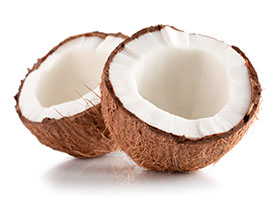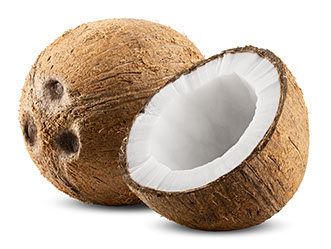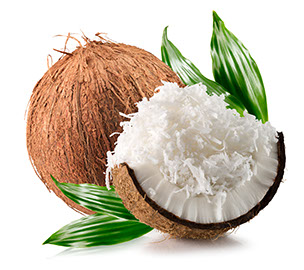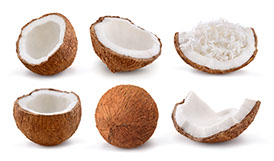
Overview
Compatibility & Temperature
Grade Tolerances
Nutrition Information
Coconuts

Found throughout the tropic and sub-tropic area, the coconut is known for its great versatility as seen in the many domestic, commercial, and industrial uses of its different parts. Coconuts are part of the daily diet of many people. Coconuts are different from any other fruits because they contain a large quantity of "water" and when immature they are known as tender-nuts or jelly-nuts and may be harvested for drinking. When mature they still contain some water and can be used as seednuts or processed to give oil from the kernel, charcoal from the hard shell and coir from the fibrous husk. The endosperm is initially in its nuclear phase suspended within the coconut water. As development continues, cellular layers of endosperm deposit along the walls of the coconut, becoming the edible coconut "flesh". When dried, the coconut flesh is called copra. The oil and milk derived from it are commonly used in cooking and frying; coconut oil is also widely used in soaps and cosmetics. The clear liquid coconut water within is a refreshing drink. The husks and leaves can be used as material to make a variety of products for furnishing and decorating. It also has cultural and religious significance in many societies that use it.
Sources: Wikipedia

Compatibility
Ethylene Production and Sensitivity: Very low to near zero for mature husked coconut. There are no reports of sensitivity to ethylene.
Temperature
Optimum Storage Conditions: Mature coconuts with husk can be kept at ambient conditions for 3 to 5 mo before the liquid endosperm has evaporated, the shell has cracked because of desiccation or sprouting has occurred. Storage at 0 to 1.5 oC (32 to 35 oF) and 75 to 85% RH is possible for up to 60 days for mature, de-husked coconuts (Maliyar and Marar, 1963) and 13 to 16 oC (55 to 60 oF) and 80 to 85% RH for 2 weeks or less. Low RH and high temperature should be avoided.
Sources: usda.gov
Quality Characteristics and Criteria:
Maturity, size, freedom from blemishes, cracking, freedom from fiber of husked coconuts, and wet or moldy eyes are major quality characteristics. Check for a sloshing sound for presence of coconut water in the nut. Coconut milk is obtained by removing and grating the hard white flesh and squeezing out the milky juice. Immature, de-husked coconuts are about 10 cm (4 in) in diameter, weigh about 500 g (1.1 lb), have 100 g (3.5 oz) endosperm, 120 g (4.2 oz) shell and 250 g (8.8 oz) water.

Nutrition Facts
Serving Size 1 cup of shredded
Amount Per Serving
Calories from Fat 241Calories 283
% Daily Values*
Total Fat 26.79g 41%
Saturated Fat 23.758g 119%
Polyunsaturated Fat 0.293g
Monounsaturated Fat 1.14g
Cholesterol 0mg 0%
Sodium 16mg 1%
Potassium 285mg
Total Carbohydrate 12.18g 4%
Dietary Fiber 7.2g 29%
Sugars 4.98g
Protein 2.66g
Vitamin A 0% Vitamin C 4%
Calcium 1% Iron 11%
* Percent Daily Values are based on a 2000 calorie diet. Your daily values may be higher or lower depending on your calorie needs.
Nutrition Values are based on USDA Nutrient Database SR18

Century Farms International, Inc.
10957 NW 123rd Street Medley, FL 33178
Office: 305-436-7971 Fax: 305-436-7968



